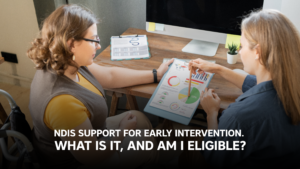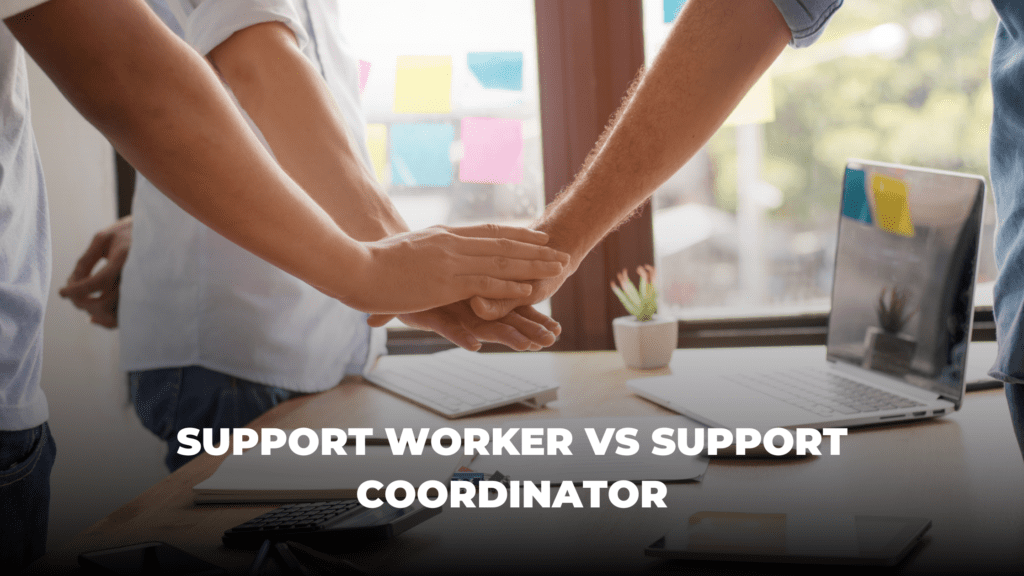Understanding the Roles of Support Workers and Support Coordinators in the NDIS
When you think of support in the context of the NDIS, you might picture a support worker—someone who directly assists you with the NDIS services you have chosen. However, are you familiar with the role of a support coordinator and how it differs from that of a support worker?
Both roles are vital for NDIS participants, but they serve distinct functions. This blog will help clarify the differences between these positions, enabling you to understand who to approach and when.
Who Is a Support Worker?
Support workers are the frontline helpers within the NDIS framework. They work directly with participants, providing assistance with everyday tasks such as personal care, meal preparation, mobility, and social interaction. Their primary goal is to enhance the participant’s quality of life by offering practical, person-centred support in daily activities.
Key Responsibilities:
- Assisting with daily living activities: bathing, dressing, and eating.
- Supporting participants in community activities and outings.
- Providing emotional support and companionship.
- Helping with household tasks, such as cleaning and cooking.
Who Is a Support Coordinator?
In contrast, support coordinators focus on guiding participants through their NDIS plans. Their role involves helping participants understand their plans, connecting them with appropriate services, and ensuring they utilise their funding effectively. While support workers provide hands-on care, support coordinators are more involved in planning, organising, and managing the necessary services.
Key Responsibilities:
- Assisting participants in understanding and implementing their NDIS plans.
- Linking participants to various service providers and community supports.
- Coordinating and managing different services to align with the participant’s goals.
- Building the participant’s capacity to independently manage their own support over time.
How to Decide If You Need a Support Worker or a Support Coordinator?
Wondering whether you need a support worker or a support coordinator? Here’s a guide:
Support Worker: When You Need One
- You require hands-on assistance to carry out daily activities and maintain your independence.
Support Coordinator: When You Need One
- You need support in understanding your NDIS plan, implementing it, and optimising it, particularly if your needs are complex and involve multiple services.
| Key Differences | Support Worker | Support Coordinator |
|---|---|---|
| Role Focus | Direct care and daily support | Managing and coordinating services |
| Interaction with Participants | Regular, often daily interactions | Less frequent, but critical for planning and connections |
| Skill Set | Practical skills for direct care and support | Strong organisational, communication, and problem-solving skills |
| Goal Orientation | Improving daily living experiences | Empowering participants to understand and effectively use their NDIS plan |
While both are integral to the success of an NDIS plan, they occupy different roles. Recognising these differences enables participants and their families to make informed decisions regarding the support they may require.
both play essential roles in ensuring participants remain well-supported and independent. If you’re looking to become an NDIS provider or explore NDIS provider registration, connect with HPA to find the best support worker or support coordinator for your needs!
Latest NDIS News in Australia

ndis business profitability strategies and factors
Becoming an NDIS provider Registration is a great investment and a business opportunity that offers a lot and while navigating NDIS business registration and NDIS

Allied Health Professionals in NDIS: What you need to know
The NDIS Scheme helps a large group of people with disabilities in Australia by providing support and services to enhance their lives. And to become

How to create a positive NDIS participant experience
How to create a positive NDIS participant Whether you’re Working as an NDIS provider or wanting to become an NDIS provider, Ensuring a great experience

Common Mistakes in NDIS Audit and How to Avoid Them
Becoming a National Disability Insurance Scheme become an NDIS provider provider can be a great business opportunity, but it also comes with a lot of

NDIS Plan Management Self Managed VS Plan Managed
Helping participants navigate their plans effectively is an essential part of providing service and ensuring quality in your provider business. NDIS plan management is fundamentally

How to Stay Informed: NDIS Resources and Updates You Need to Know
NDIS Resources Navigating the National Disability Insurance Scheme (NDIS) can often feel challenging and overwhelming. With updates on policy changes, new guidelines, and various support
Hear from Our Clients









